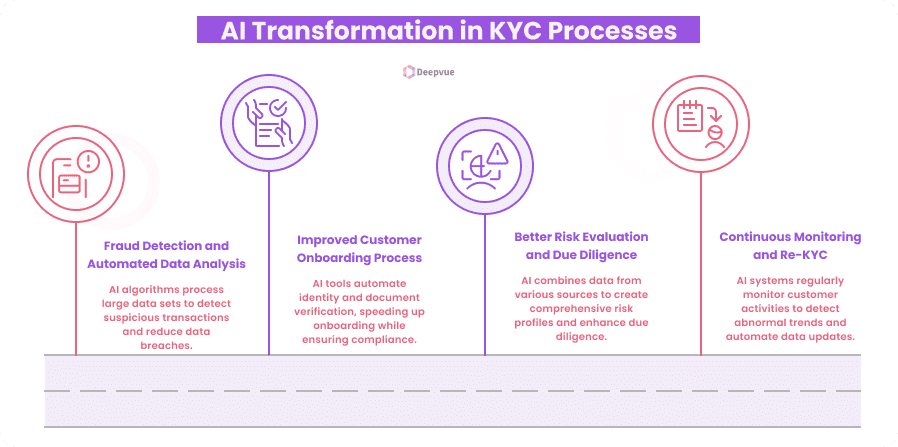In the age of rapid digital transformation, businesses feel the mounting pressures of convenience, security, and compliance. In the history of KYC, businesses have associated processes with lengthy procedures, manual errors, and high operational costs that burden businesses and, more annoyingly, give customers frustrating experiences.
Artificial Intelligence is a solution that emerges to these issues, revolutionizing the way business approaches KYC verification. AI processes automate, enhance accuracy, and streamline customer interaction so that KYC, which is otherwise a tedious obligation, now becomes an efficient, customer-centric process.
This blog focuses on how AI in KYC is transforming and improving customer journey efficiency and smoothness.
The Problems with Conventional KYC Procedures
- Time-Consuming Processes: It often takes days or weeks to manually collect, verify, and cross-check documents to validate customer identities.
- High Operating Costs: The organization has to incur considerable expenses on manpower, training, and managing the compliance teams for KYC processes.
- Human Mistakes: There is a tendency to make errors in manual entry and data verification, leading to wrong results and rechecking.
- Risk of Fraud: In direct verification, most static methods fail to curb fraud through complicated schemes like document forgery or identity theft.
- Poor Customer Experience: Long and obtrusive verification processes often make customers frustrated and lead to drop-offs and dissatisfaction.
How AI is Transforming KYC Processes?

- Fraud Detection and Automated Data Analysis
The processing of large data sets by AI algorithms can detect suspicious transactions and fraudulent activity. They significantly improve the accuracy of risk evaluations and are particularly good at reducing data breaches.
AI-powered technologies can quickly scan millions of transactions and identify trends that can lead to fraud. Compliance teams can focus on more complex issues that require human action because of the time saved. Some systems also have real-time analytic capabilities, allowing Perpetual KYC in preventative safety measures.
- Improved Customer Onboarding Process
When many documents are required for the onboarding process, the first barrier in the customer experience is usually a lot of documentation. AI tools such as OCR and facial recognition automate identity and document verification.
These technologies have sped up onboarding consumers with financial institutions while providing compliance with legal standards through prompt and accurate identity verification.
- Better Risk Evaluation and Due Diligence
Artificial intelligence is the most imperative tool in combining and evaluating data from numerous sources, including dispersed data such as social media and news articles, to form comprehensive risk profiles. This feature is very helpful in finding beneficial owners and further doing due diligence on them, which enhances adherence to international laws.
Financial institutions can take proactive measures to prevent or reduce possible hazards by exploiting AI-driven risk assessments, which are more comprehensive regarding such risks.
- Continuous Monitoring and Re-KYC
One of the great advantages of AI in KYC processes is that it becomes possible to monitor consumer activities and habits regularly. These AI systems continually scan for trends that look abnormal and thus tend to lead one to believe that some form of illicit activity or even money laundering exists. A part of the re-KYC process is also automated by AI, which means that customer data is updated with minimal manual labor.
Advantages of AI in KYC Procedures
- Increased Productivity: Automated repetitive jobs accelerate processing and enhance the entire customer onboarding process.
- Improved Accuracy: Artificial intelligence eliminates errors in data input and verification caused by human errors.
- Cutting Costs: Financial institutions can maintain high accuracy while lowering operating costs by automating labor-intensive processes.
- Improving Fraud Detection: Advanced analytics with real-time monitoring will enable the system to identify fraudulent activity that might evolve into significant abuse.
- Scalability: AI in KYC can accommodate large data, making it perfect for scale companies and busy seasons.
- Adherence to Regulations: Without humans, automated compliance guarantees that financial institutions follow the set international standards.
Addressing Concerns: Balancing Innovation with Privacy
Although AI provides many benefits, its implementation in KYC verification raises the question of data privacy and security. Businesses must address these challenges by:
- Data Encryption: Ensure that encryption is applied across all customer data processed by the AI systems. This will avoid any unauthorized access to the AI systems.
- Compliance with the Regulations: The company needs to comply with data protection laws like DPDP, GDPR, or CCPA and maintain transparency in its activities, including the collection, storage, and use of customer data.
- Implementing Ethical AI Practices: The AI model should be exposed to diverse data to avoid biases that result in unfair customer treatment.
The Future of AI in KYC Verification
As AI advances, its effects on KYC verification will multiply exponentially. The emerging trends are:
- Decentralized Identity Systems: Blockchain-based technologies with AI would empower customers to handle their digital identity while sharing only required information with service providers.
- Predictive Analytics: AI in KYC would use predictive models to predict what the customer may need, hence making KYC processes more personal.
- Voice and Gesture Recognition: Advanced biometric technologies will make verification smoother, requiring little user interaction.
- Integration with IoT Devices: AI-powered KYC systems may integrate with Internet of Things (IoT) devices, enabling instant verification in connected environments, such as smart homes or vehicles.
The Path Ahead: AI and the Future of KYC Verification
AI is changing the conventional and exhaustive obligation of KYC verification into a seamless, customer-friendly process. Besides, AI in KYC ensures compliance by doing all the redundant work with a heightened level of security and personalization experiences while creating trust and delight for customers.
For businesses, AI-driven KYC solutions are no longer an option but a strategic imperative in an increasingly digital world. Organizations can get the perfect balance between regulatory compliance and exceptional customer experience by unlocking the potential of AI.
To know more about KYC and the verification process contact our team.
FAQ:
How does AI improve the KYC process?
AI improves KYC by automating the verification of documents, biometric authentication, and real-time risk assessment. There will be fewer errors and quicker processing with an overall improvement in the customer experience.
What technologies does AI use in KYC verification?
AI employs technologies that include, optical character recognition (OCR), machine learning, NLP, or biometric recognition, such as facial, fingerprint, or voice recognition.
How does AI-powered KYC benefit customers?
AI reduces onboarding time for customers and makes them encounter fewer errors with a smoother, more intuitive experience. It eradicates lengthy paperwork and manual processes for AI.
Which industries use AI in KYC verification?
AI-driven KYC is applied widely in banking, financial services, e-commerce, telecommunications, healthcare, and any sector that requires identity verification.








